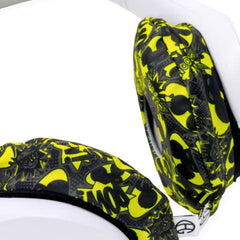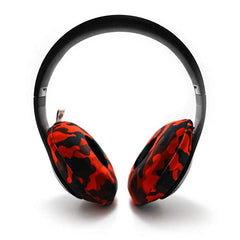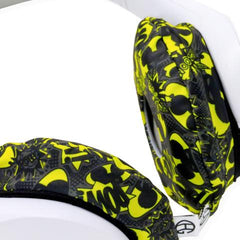Excessive Sweating During Exercise

It’s normal to sweat a lot during exercise.
Our bodies use moisture as a means of maintaining a healthy core temperature and it’s the process of that moisture evaporating off our skin that helps to keep us cool.
Excessive sweating is a broad term. What’s excessive for one person won't be excessive for someone else.
Some people like to sweat a lot during exercise because it makes them feel as if they’ve worked hard. Others, however, may feel that they’re sweating too much, and they may feel self-conscious or embarrassed even in gyms or during classes where getting hot and sticky is actively encouraged.
Sweating excessively during exercise is rarely a sign that there’s something medically wrong but if you’re concerned then it’s always worth chatting to your GP.
There are things to be done, too, that can help reduce the appearance of sweating.
What is Sweat?
Sweat is water, protein, salt, urea and ammonia.
As our bodies begin warming up, our sweat glands start producing moisture. The average person has been 2 and 4 millions sweat glands in their skin.
It’s the eccrine glands found on the feet, palms, forehead, cheeks and armpits that are responsible for regulating body temperature.
It’s not the moisture on our skin alone that keeps us cool but a process known as thermoregulation. The sweat on our skin is evaporated into the air around us and its that evaporation that keeps us cool.
You’ve probably noticed how tough it is to keep cool (and to get rid of sweat) when there’s high humidity. This is because the air is already filled with moisture and the sweat cannot evaporate efficiently.
What Causes Excessive Sweating During Exercise?
What counts as excessive sweating is different for everyone.
You might have 2 million sweat glands. You might have 4 million. Testosterone generally makes men sweat more. Oestrogen helps keep women cooler. Your weight plays a part, too. The heavier someone is, the more likely that they’ll sweat more.
Your genetics can play a role: if you’re parents were heavy sweaters then chances are that you are, too.
If you grew up in a cooler climate, then you’re body may have adapted to sweat less. Grow up in hot countries and it’s likely that you’ll sweat more.
When and where you exercise will have an impact, too.
If you’re running outside rather than in an air-conditioned gym, then you may find your sweating more often. Of course, the time of year and climate can make you sweat more or less. And as mentioned earlier, humidity can make a real difference.
The type of clothing that you’re wearing can either make you sweat more or it can make you feel as if you’re sweating more. For example, cotton tends to hold onto moisture and so a workout shirt could quickly become sodden.
How much you sweat can also be influenced by any medication you’re taking.
There’s also a condition known as hyperhidrosis that causes excessive sweating during day-to-day life. If you’re sweating throughout the day regardless of temperature or physical activity then it’s worth talking to a GP or reading up on the symptoms of hyperhidrosis.

Is Sweating a Sign of a Good Workout?
Possibly.
A number of studies have suggested that people in better shape will sweat more and sooner than those who are less fit.
It’s not a particularly accurate way of measuring fitness but it seems that over time the body adapts to sweating more efficiently. Often that means the sweat glands start producing moisture earlier into a workout because the body recognises what’s happening and then can respond ahead of time.
Some people might associate sweating with poor fitness but that doesn’t appear to be the case.
You may find you’ll sweat excessively during a workout if you’re in the process of acclimatizing. Heat acclimation is what many professional athletes do in the run-up to a competition or event. By training in hot climates, they’re forcing the body to adapt quickly and efficiently which then gives an advantage when they return to lower temperature. There’s an interesting post on heat acclimation on the Trail Runner website. One thing this type of training does is make later workouts less gruelling but it also helps the body to sweat more efficiently. If you’ve recently started training in a hot climate you’re not used to, then prepare to sweat more.
How Can I Prevent Sweating During Exercise?
Grab an antiperspirant that works. If you don’t think the one you’re using is enough then speak to a pharmacist or your GP about getting something stronger.
Wearing moisture-wicking clothing can help. Moisture-wicking materials are man-made fabrics often used in the production of athletic wear. It has a wider surface area so sweat can quickly move to the surface where it will be evaporated. Polyester and nylon are two popular fabrics but look out for spandex (oh-er), polypropylene, merino wool and bamboo. Moisture-wicking fabric won’t absorb sweat and it’ll help keep you drier and more comfortable than cotton.
If you wear headphones during exercise, then wearing sweat-proof covers over the cushions will help. These are made from moisture-wicking fabric and will stop sweat seeping into the cushion of the headphone and creating an unpleasant smell. It’ll also stop any sweat forming on the cushions from pooling on your face.
Wearing things on your head can make you sweat more. Try a sports headband rather than a cap.
Caffeine and spicy foods can trigger sweating so if you’re particularly sensitive then it’s worth reducing your intake around the time you plan to exercise.
Check humidity levels and if it’s really hot then take your workout inside.
Sweating is a normal bodily response to intense exercise. If you're working out in headphones, then remember to add a pair of sweat-proof covers to the cushions so that your headphones stay dry and moisture-free (even if the rest of you doesn't).







